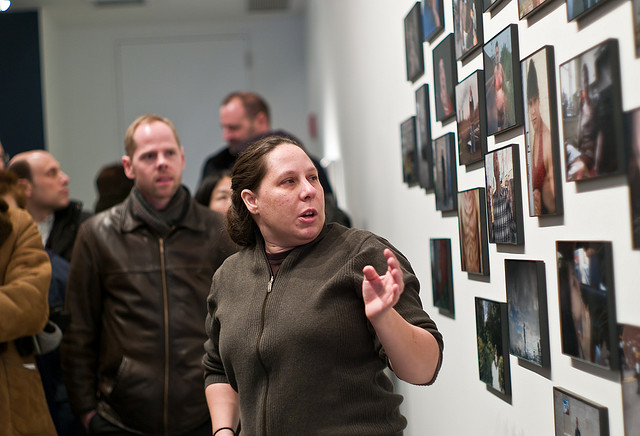
Seeing the world through the lens of Zoe Strauss
Zoe Strauss. Photo by Flickr user Susan Sarmoneta. Zoe Strauss looks at things differently.
For years, the self-taught photographer, installation artist and community activist, has been capturing reality through her lens in ways that others often don’t see. Or don’t want to see.
Strauss, who began her professional career as a photographer in 2000 by taking pictures of fringe and marginal communities in her hometown of Philadelphia, will be in South Florida on Sept. 4 for a conversation with Dennis Scholl, vice president of arts for Knight Foundation.
“Zoe sees the disenfranchised, and embraces their existence. In a way, she celebrates it,” says Scholl. “She really embraces the idea of reaching out to people, and connects with them in a profound way.”
Scholl has not been immune to that power of connection. As an art collector himself, he has followed Strauss’ career for several years now, and felt that her work would resonate with South Florida audiences.
“I’ve known Zoe for a long time. In fact, before I was at Knight Foundation, I commissioned Zoe to create something for the Scholl collection,” remembers Scholl, referring to a slideshow and a series of photographic prints that were exhibited at an art space, World Class Boxing, that he and his wife Debra founded.
“Zoe shows us what we typically don’t want to see: an unsentimental view of the realities of urban blight, poverty, drug abuse, alternative lifestyles and prostitution in cities across the country,” wrote Lorie Mertes, former assistant director for special projects and curator at Miami Art Museum, of Strauss’ creations in an essay for World Class Boxing on occasion of her Miami exhibit, “Works-in-Progress: Miami 2008.”
Scholl discovered Strauss’ unique vision thanks to one of the many awards that she has won throughout her career, a United States Artists (USA) grant in 2007.
“Interestingly enough, I looked at the list of the artists who won that year, and I knew all of them except for Zoe,” says Scholl, who along with his wife donated a dozen of her works to the Pérez Art Museum Miami. “So I reached out to her.”
Strauss, in her early 40s, has been reaching out to people normally forgotten or ignored by others since the mid-1990s, when she launched the Philadelphia Public Art Project with the mission of making art accessible to everyone in Philadelphia.
Then, from 2001 to 2010, she presented photographs of members from her community in what was known as the annual one-day “Under I-95” show, which took place beneath the interstate in Philadelphia the first weekend of May.
For a few hours, she would exhibit her pictures on the concrete pillars that support the highway, and sell copies for just $5 each as a means of making art democratic.
That body of work was exalted by the Philadelphia Museum of Art in a 2012 mid-career retrospective called “Zoe Strauss: 10 years,” which later went to New York City’s International Center of Photography.
Besides the portraits that have won her all sorts of accolades – a 2007 review in The New York Times said that her work “… stood out in the last Whitney Biennial and is equally impressive in her first New York solo show” – Knight Foundation’s Scholl highlights other aspects of her photographic narrative, such as “The Billboard Project.”
“She’ll be driving along the road and she’ll take a picture of a sign that is missing letters, or graffiti, things like that,” explains Scholl. “They stop you in your tracks, and they make you think.”
Without words, just images.
Dennis Scholl and Zoe Strauss in Conversation, Thursday, Sept. 4, 6:30 p.m., at One Bal Harbour Resort & Spa, 10295 Collins Ave., Bal Harbour. RSVP: [email protected]